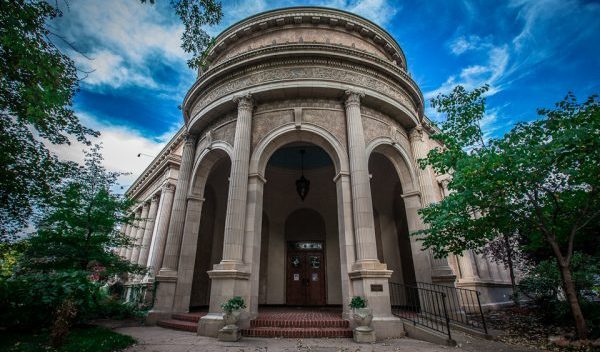The long road home to love and acceptance
by: Rev. Dr. David Bahr
My little country church in North Dakota has a long history of sending people into ministry. There is a framed collage prominently displayed in the church of the more than 20 men and women who have become pastors and missionaries dating back 125 years. This is a proud legacy, one, despite the fact I’ve been an ordained minister for 20 years, I am not a part of, because I am gay.
I don’t pretend this doesn’t bother me. It really irks my mother. We’re still related to every other person in the church. I could quote Jesus and say “no prophet is accepted in the prophet’s hometown.” But in fact it’s just simple homophobia.
Not the kind the carries hateful signs. Not the kind that refuses to speak to you or bars you from entering – just a quiet refusal to acknowledge.
The author of a memoir set in North Dakota calls this “prairie silence.” Just don’t talk about it at the potluck over hotdish and bars.
But God bless my mother. At my father’s funeral she made sure the pastor read the names of all his children and all their spouses, including mine.
Ordination in the United Church of Christ requires a job offer. There must be a recognized calling that’s gone through a myriad of committees and the completion of the required education, but ultimately someone – a church, a hospital, a recognized non-profit – some entity has to want to hire someone ordained before an ordination can occur.
That has been a real stumbling block for LGBT people and women with a call.
The first ordination of a gay man happened 40 years ago, but it happened through an extraordinary ecclesiastical council, not a job offer.
It wasn’t until 12 years later that the first predominantly straight church chose to call an out lesbian to be its pastor, who was already ordained. By the time I was ordained, there were only about six of us serving in churches among our, at the time, nearly 6,000 churches.
In 1992, I interviewed with an historic church in Cleveland that once had 1,000 members but now had a high of 40 in worship, mostly over the age of 75. A church that once had some money, but after spending $40,000 to $50,000 a year to make budget, didn’t have much left. A dirty building that hadn’t been seriously taken care of for years. And they had a secretary who ruled the church with an iron fist.
When I interviewed, it was their third search committee in three years. They were desperate enough to try something different.
The first candidate chosen by the committee had been rejected by the secretary before the church could vote because his name sounded Jewish.
The congregation voted to call the second one, but he quit before he started when he learned the extent of the power of the secretary.
And now, a third committee. This time with her on it – more efficient.
Mary May Meister.
My first interview in June went well. I felt we gelled and they appreciated my experience of being a solo pastor in college and seminary. But I heard nothing.
No “thank you for the interview.”
No “we’ll get back to you.”
In August, I wrote a letter asking to be informed that I was no longer a candidate. And I got one, a letter saying that while most on the committee felt I was their best choice, a few did not and they could not risk a split in such a small church.
I was, frankly, a little relieved not to be going to a church that had assessed its own life at five years – three years before. Who wants a church ready to be closed on your resume? But a few weeks later, they wanted me back in the process. I reluctantly agreed.
In December, I was asked to be presented to the congregation: to preach, after which the congregation would ask questions and vote. But they suspected that some of the questions at the congregational meeting might not be all that appropriate. So, to blunt some of the worst of them, they designated a lovely 85-year-old man, a died-in-the-wool, John Birch society, conservative to be asked the questions and then for him to ask me, standing next to him.
It worked well for about 15 minutes. Then the nasty came. Salacious questions about sex, for which my front man just turned to me. It was awful, and in 15 minutes, they ended the discussion.
I was told to wait in the back while the congregation deliberated and voted.
I thought it might be better to let it go and go home, but I waited. And waited. And waited. And finally some loud commotion came from the sanctuary that included what sounded like outbursts of yelling and screaming. It was. Once they had gotten a calculator to confirm that 27 to 13 was indeed the necessary two-thirds majority, one person excited to welcome me took the microphone and spoke too close so it was a loud muffled sound. A few people clapped. There was a scream from Mary May. A few others said everyone there was going to Hell.
So then I had to go downstairs to greet everyone. I really wanted to go home. As I stood putting sweetener in my coffee, Mary May made a beeline over to me: “You can just go home and have sex with anything you want now,” she yelled. We’re going to have to keep our children away from you.”
I told her I appreciated her honesty and turned away and was greeted by six older women who took my hand and said, “We’re glad you’re here.”
On my first Sunday a month later, 11 of the 13 who voted no didn’t come, and despite all my uncomfortable visits to their homes, they never did.
Mary May sat in the back pew with arms crossed and fuming.
As word spread through the city of my impending ordination, with a big newspaper article, my box overflowed with hate mail. It just makes you wonder how people can have so much bile in them – and time on their hands.
The church that had promised to do renovations on our parsonage now backed out and said they wouldn’t.
At least the pastor took me to lunch to deliver the news.
Another pastor stopped by to deliver a letter from his church council that said that any ecumenical service where I would be a participant, they would not attend.
Then, with a plastic smile, he said, “But we love you. And I want to count you among my friends.”
A major donor to the UCC wrote to the president to say that if he didn’t stop my ordination, he would stop giving money to the denomination.
And a message left on the answering machine promised to burn the church down with me in it.
That I took to the police, who said they couldn’t do anything unless it happened. I kind of knew that, but at least the police chief knew, and I could inform him that there might be protesters at the ordination, as promised.
There was good too.
The Methodist pastor across the street organized a team to be on hand in case of trouble so that my ordination would not be interrupted. As it turned out, the only form of protest were hand written cards quietly placed on car windshields that said, “God doesn’t make people gay.”
The UCC president sent a letter back to the big donor saying he was sorry he felt that way, and then sent a letter of congratulations to be read at the service.
A hundred people who knew nothing of our church came to the ordination as a result of reading the newspaper article, and a few came back the following Sunday.
We survived on half a shoestring, attracting enough new people to almost counteract the number of people dying or entering nursing homes.
They had been right. As it was, the church only had the money and people left for a few more years. But it’s still there today, while every other mainline and Catholic Church in the neighborhood has since closed.
The congregation that hired me took a risk at splitting the church and opened the door for so many others.
But make no mistake, this is still the exception. And much, much worse has happened than ever happened to me.
A pastor in southern Minnesota had bullets shot into his house. Other churches have survived vandalism, including being set on fire. This is still happening, and will continue to happen for a long, long time. Which is one reason I think we cannot distance ourselves too much. It’s good to remember that we are an exception in the world, and it’s easy to forget that. But we can’t forget it.
There is a long road to build for others yet to come.
What's Your Reaction?
Founded in 1976, Out Front is the largest LGBTQ news organization in the Rocky Mountains. "Like" Out Front on Facebook: facebook.com/outfrontcolorado, and follow us on Twitter: @outfrontco.










